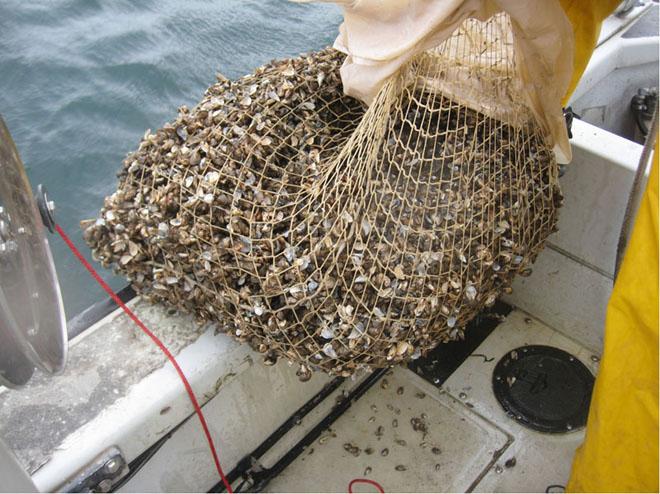Help stop spreading of the invasive Quagga mussel
by Sail-World.com on 15 Oct 2014

Quagga mussels collected with an epibenthic dredge. NOAA .
http://www.noaanews.noaa.gov/
Is the Quagga mussel in your cruising waters? The Quagga mussel has been discovered for the first time in the UK. The discovery was made by Environment Agency teams carrying out routine water quality testing on River Wraysbury. It has subsequently been found in the nearby Wraysbury reservoir too.
The identification was confirmed by Dr David Aldridge of Cambridge University on 1 October 2014.
Since the mussel was identified the Environment Agency has been working with partners including Thames Water, Angling Trust and local angling clubs, to put biosecurity measures in place. Work is now taking place to monitor the River Thames and reservoirs in the local area to investigate the extent of the problem and the distance that the quagga mussel has spread.
The quagga mussel is a prolific breeder – a fully mature female mussel is capable of producing up to one million eggs per year. Due to its ability to filter out large quantities of nutrients and to breed quickly, the quagga mussel can significantly reduce native populations and affect freshwater ecosystems. It can outcompete native mussels. This alters the ecology of the habitats it invades. It can also block water pipes and smother boats’ hulls.
Sarah Chare, deputy director of fisheries and biodiversity at the Environment Agency, said:
Invasive species – such as the quagga mussel – cost the UK economy in excess of £1.8 billion every year. And while Britain’s rivers are the healthiest for over 20 years, rivers that harbour non-native species could fall short of tough EU targets.
The quagga mussel is a highly invasive non-native species, affecting water quality and clogging up pipes. We are monitoring the extent of its spread and working closely with partners to ensure they are aware of it.
If you spot one then please report it to us through the
online recording form. Like the zebra mussel and killer shrimp this species comes from the Ponto-Caspian region – an area around the Black and Caspian seas in south-east Europe.
Simon Earl, head of water production at Thames Water, said:
Another invasive species is the last thing we need clogging up our network. But we have a lot of experience in dealing with zebra mussels, which are similar to quagga mussels, and there is no threat to the quality of the water we supply to our customers. We’ll continue to work closely with the Environment Agency to monitor the mussels discovered at Wraysbury reservoir.
Mark Owen, head of freshwater at the Angling Trust, said:
It’s vitally important that all water users, including anglers, take every possible precaution to stop this species spreading throughout the UK. Quagga mussels could do untold damage to freshwater and estuarine environments if they are allowed to spread which could have a significant impact on marine and freshwater fish stocks.
The mussels tend to be about the size of a human thumbnail but can grow to about 4cm. The larvae of quagga mussel are not visible to the naked eye, which makes drying a critical step in applying good biosecurity.
Advice from The Green Blue, following the discovery of the invasive Quagga Mussel in the Wraysbury River and Reservoir, is to make sure boat users ‘Check Clean, Dry’ their boats and equipment before changing locations.
Jane Swan, The Green Blue Project Manager 'The Quagga Mussel is a highly invasive non-native species. It can affect whole ecosystems by filtering out large quantities of nutrients. It also presents a serious biofouling risk by blocking pipes, smothering boat hulls and other structures.
'Eradication of most invasive species once established outside their usual range is very difficult so the best approach to deal with arrival of new species is to focus on better biosecurity, especially the Check, Clean, Dry routine for both inland and coastal boating activities'.
On the water
• When leaving an anchorage, wash off both the anchor and chain before stowing.
• Avoid sailing or motoring through water plants and weed if possible.
On land
• Check equipment and clothing for live organisms – particularly in areas that are damp or hard to inspect before moving them to a new location. The difficulty with the Quagga Mussel is that it produces abundant populations of microscopic ('veliger') larvae which are invisible to the eye. So soaking equipment and clothing in hot water on site or when you return home as well, will improve the chances of killing larvae and adults.
• Clean all parts of the boat, trailer and equipment that come into contact with the water before leaving.
• When recovering a trailer, dinghy, PWC or RIB, drain water from every part of the boat and all equipment that can hold water.
Static submerged structures
• Any structures or equipment such as pontoons, piles and buoys which have been submerged in water for a time also pose a higher risk of spreading invasive species and so extra care should be taken when moving or working with them.
• For specific biosecurity guidance follow this link submerged structures.
How to Identify the Quagga Mussel
Quagga mussels are quite similar to zebra mussels, another invasive species which is already widespread in England and Wales. They are small with a dark brown and light brown stripy shell. They are more rounded than a zebra mussel so when placed on its front it will roll to one side. Quagga mussels also have an undulating (as opposed to a straighter, horizontal) seam between the shells.
If you want to link to this article then please use this URL: www.sail-world.com/127762